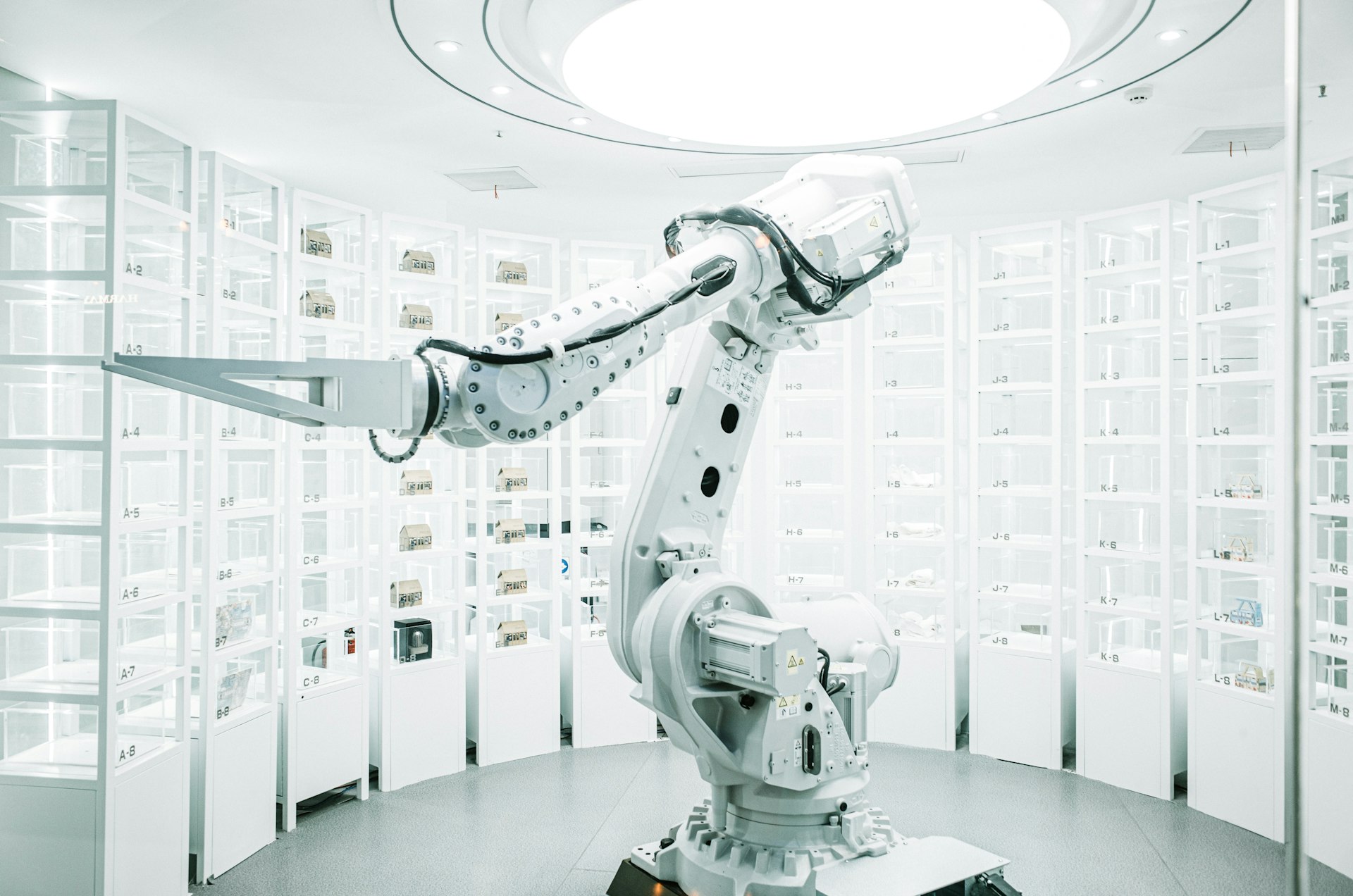Unlock Your Future: Exploring Career Opportunities in Robotics and Automation

Photo by Simon Kadula on Unsplash
Introduction: The Rise of Robotics and Automation Careers
The field of robotics and automation is rapidly transforming industries worldwide. From manufacturing and healthcare to aerospace and logistics, organizations are harnessing advanced technologies to boost efficiency, improve safety, and meet evolving market demands. This surge in innovation is creating robust career opportunities for those with the right skills and qualifications, offering not only strong job security but also the chance to drive meaningful change in the world [1] .
Key Roles in Robotics and Automation
Robotics Engineer
Robotics engineers design, build, and maintain robotic systems used in diverse sectors such as manufacturing, medical devices, and aerospace. Their responsibilities span mechanical design, electronic integration, programming, and testing. Increasingly, these professionals need fluency in artificial intelligence (AI) to create adaptive, intelligent systems [1] . For example, in automotive plants, robotics engineers develop robotic arms for assembly lines, while in healthcare, they create surgical robots that enhance precision and patient outcomes.
The average salary for robotics engineers is approximately $114,052 per year, with additional compensation through bonuses and profit sharing [4] . To access these roles, a bachelor’s degree in mechanical engineering, electrical engineering, or computer science is typically required. Some employers prefer candidates with master’s degrees or specialized certifications [4] .
Automation Engineer
Automation engineers focus on programming robots and systems to perform repetitive tasks with greater speed and accuracy than human labor. They are vital in industries such as manufacturing, logistics, pharmaceuticals, and energy, where automation reduces costs and enhances productivity [1] . Their work involves integrating sensors, developing control systems, and ensuring seamless operation between automated processes and human workers.
With automation technologies advancing, engineers who specialize in AI-driven systems or Industrial Internet of Things (IIoT) are in high demand. The average salary for automation engineers is around $111,910 per year [1] . To enter this field, candidates typically need a bachelor’s or master’s degree in automation engineering, computer science, or a related discipline [3] .
Robotic Process Automation (RPA) Specialist
RPA specialists develop scripts and bots to automate digital processes, reducing error rates and increasing throughput in sectors ranging from finance to supply chain management. Experts in this role use platforms such as UiPath and Blue Prism to build, deploy, and maintain software robots that handle routine tasks, freeing up human employees for more strategic work [2] . For example, RPA is widely used to streamline invoice processing, data entry, and customer service workflows.
To pursue a career as an RPA specialist, proficiency in programming languages (such as Python or Java), knowledge of business processes, and hands-on experience with RPA tools are required. Many professionals transition into RPA from IT or business analytics backgrounds [2] .
Robotics Technician
Robotics technicians install, maintain, and repair robotic systems across many industries. Their responsibilities include troubleshooting errors, performing regular maintenance, and training systems to execute specific tasks. For instance, technicians may work on robotic arms in manufacturing or automated guided vehicles (AGVs) in warehouses [4] . Most positions require an associate degree or technical certification in robotics, electronics, or mechatronics, plus hands-on experience with industrial robots like ABB, FANUC, or KUKA [3] .
AI & Machine Learning Specialist
AI and machine learning specialists create models, algorithms, and systems that allow robots and automation platforms to learn, adapt, and make decisions. Their work powers advancements in predictive maintenance, quality inspection, and intelligent control systems. For example, AI-driven robots can detect defects on assembly lines in real-time or optimize warehouse logistics using data analytics [2] . A strong foundation in mathematics, data science, and computer programming is typically required, along with expertise in machine learning frameworks like TensorFlow or PyTorch.
Industries Hiring Robotics and Automation Professionals
Robotics and automation professionals are in demand across a wide array of sectors:
- Manufacturing: Automated assembly, quality inspection, and process optimization.
- Healthcare: Surgical robots, rehabilitation devices, and medical imaging automation.
- Logistics & Warehousing: Automated guided vehicles, smart inventory management, and robotics for order fulfillment.
- Aerospace: Autonomous drones, robotic exploration systems, and maintenance automation.
- Pharmaceuticals: Automated testing, packaging, and quality assurance systems.
- Consumer Technology: Home automation, entertainment robots, and personal assistants.
With the acceleration of Industry 4.0, nearly 97 million new roles in AI and automation-related fields are projected to emerge by the end of 2025 [1] .

Photo by Natalia Dziubek on Unsplash
Educational Pathways and Skills Development
Most careers in robotics and automation require at least a bachelor’s degree in engineering, computer science, or a related discipline. Advanced roles may call for a master’s degree or specialized certification in areas like AI, mechatronics, or robotics engineering [4] . Key skills include:
- Mechanical and electrical design
- Programming (Python, C++, Java)
- AI and machine learning techniques
- Sensor integration and control systems
- Problem-solving and analytical thinking
For hands-on learning, consider pursuing technical certifications or enrolling in online courses from accredited institutions. For example, the University of Cincinnati and the University of Bridgeport offer dedicated programs in robotics and automation. Online platforms like Coursera provide flexible options for degree and certificate programs [5] .
How to Access Career Opportunities
To begin your journey, follow these actionable steps:
- Identify Your Path: Research roles that match your interests and background. Visit reputable job boards such as Indeed for current openings [3] .
- Develop Relevant Skills: Pursue formal education or certifications in robotics, automation, or AI. Explore online courses from accredited universities or professional organizations.
- Gain Practical Experience: Look for internships, co-op programs, or entry-level roles to build hands-on expertise. Many industries offer apprenticeships or training programs for aspiring technicians and engineers.
- Network Strategically: Attend industry conferences, join professional associations (such as IEEE Robotics & Automation Society), and participate in online forums to connect with experts and potential employers.
- Stay Current: Follow industry news and trends through respected publications and official websites. Continuous learning is essential in this fast-evolving field.
If you are interested in formal education, search for programs at universities with strong robotics and automation departments. For example, you can explore degree programs and specialized coursework at the University of Cincinnati or University of Bridgeport by visiting their official websites [5] , [1] . For self-paced learning, consider online platforms like Coursera [4] .
Challenges and Solutions in the Field
While robotics and automation offer exciting prospects, professionals may encounter challenges such as rapid technological changes, the need for continuous skill development, and evolving regulatory standards. Solutions include ongoing education, certification renewal, and active participation in industry networks. For those switching careers, bridging gaps through specialized courses or hands-on workshops can ease the transition.
Alternative Pathways and Next Steps
If traditional engineering roles aren’t a fit, consider related opportunities such as project management, technical sales, or research and development in robotics-focused organizations. Many companies hire professionals with backgrounds in business analytics, IT, or industrial design for supporting roles in automation projects.
To explore more opportunities, use search terms like “robotics engineer jobs,” “automation technician openings,” or “AI specialist careers” on respected job boards and professional networks.
References
- [1] University of Bridgeport (2025). Careers in Robotics and Automation.
- [2] RealPars (2025). Top 5 In-Demand Jobs in Industrial Automation for 2025.
- [3] Indeed (2025). Automation Robotics Jobs, Employment.
- [4] Coursera (2025). Robots and Robotics Jobs in 2025: Career Outlook + FAQ.
- [5] University of Cincinnati (2025). Exploring careers in robotics engineering: A path to the future.
MORE FROM 9scholarships.de













